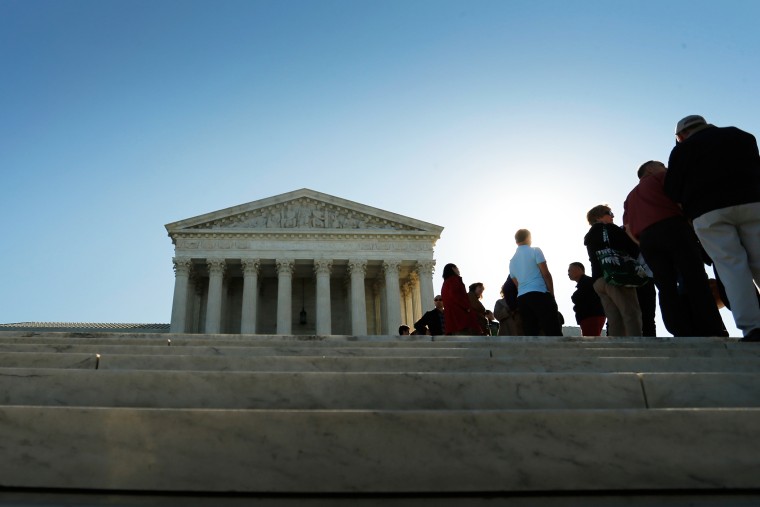Supreme Court Chief Justice John Roberts recited Eminem lyrics fantasizing about killing an ex-wife -- then asked a representative of the government if the artist should have been prosecuted, during oral arguments Monday at the high court in a case of violent rants posted on Facebook.
No, said deputy solicitor general Michael Dreeben, because Eminem's words came "at a concert where people are going to be entertained. This is a critical part of the context. It wasn't as if he stated it to her in private or on a Facebook page after having received a protection from abuse order."
Dreeben was contrasting Eminem with the actual facts of the case before the nation's highest court Monday, an appeal from Pennsylvania man Anthony Elonis, whose wife got a protection order after his Facebook rants about killing her. Elonis was convicted and sentenced to nearly four years imprisonment for making a threat. The question before the justices is whether it's enough for Elonis to claim that, rather than wanting to scare or harm his wife, he was just venting his feelings in rap lyrics inspired by Eminem. Or, to get to the core issue, does a person's intention actually matter if the recipient is frightened?
The justices seemed torn, in a case that pits free speech concerns against advocates for domestic violence survivors. But Justices Anthony Kennedy, Sonia Sotomayor and Elena Kaganall expressed concerns that setting a precedent where no proof is required that someone intended a threat could undermine the First Amendment.
"You are asking us to go down, you know, it's not purpose, it's not knowledge of causing fear, it's not a conscious disregard of causing fear, it's just that you should have known that you were going to cause fear, essentially. And that's not the kind of standard that we typically use in the First Amendment," Kagan said. And Sotomayor said, "We've been loathe to create more exceptions to the First Amendment."
The "true threats" doctrine -- a concept the justices came up with in past decisions and which they are now being asked to define -- is already one such exception to the First Amendment. But the court is being asked exactly how a jury is meant to interpret what is and isn't a threat. And that's where Elonis's attorney stumbled, baffling the justices when it came to what exactly he was suggesting a jury do to look for intent from a defendant. "You really have me confused at this point," complained Justice Antonin Scalia.
John Elwood, Elonis's attorney, said prior knowledge of fear was required. "If he is on notice that she's in fear, that is all we're asking for. That if he knows she is in fear, he doesn't have a right to continue on." Elwood said the danger was that anyone making a casual remark on the Internet would be prosecuted. "I think many of the speakers who are online and many of the people who are being prosecuted now are teenagers who are essentially shooting off their mouths or making sort of ill-timed, sarcastic comments which wind up getting them thrown in jail."
But Elonis, the plaintiff in this case, was not a teenager shooting off his mouth or making an offhand comment -- he was convicted of threatening four different parties, including a female FBI agent.
Elonis's Facebook rants escalated after his wife left him, taking with her their two kids. Elonis was fired from his job at an amusement park following sexual harassment complaints against him and an incendiary Facebook post about a co-worker. Eventually, his Facebook posts encompassed furious and detailed comments about his place of work, his wife, police officers, unnamed elementary schools he suggested he would shoot up in "the most heinous school shooting ever imagined." Another target was a female federal agent who visited his home, whom he said he would leave "bleedin’ from her jugular."
The most vivid fury was aimed at his wife. “If I only knew then what I know now, I would have smothered your a-- with a pillow, dumped your body in the back seat, dropped you off in Toad Creek, and made it look like a rape and murder,” Elonis wrote. He also wrote, "There’s one way to love you but a thousand ways to kill you” and "I used to be a nice guy but then you became a slut. Guess it’s not your fault you liked your daddy raped you.”
But Elonis also included many knowing winks to the boundaries of the law, posting a link to the Wikipedia post for freedom of speech, statements like “Art is about pushing limits. I’m willing to go to jail for my constitutional rights. Are you?” and teasing lines like “What’s interesting is that it’s very illegal to say I really, really think someone out there should kill my wife.”
The idea that all this counted as art did not impress several justices. "Well, this sounds like a road map for threatening a spouse and getting away with it," said Justice Samuel Alito, taking his cues from the briefs from advocates for survivors of domestic violence. "So you put it in rhyme and you put some stuff about the Internet on it and you say, I'm an aspiring rap artist. And so then you are free from prosecution." Roberts seemed to agree: "Based on your submission, all he has to do is say either, as I understood your brief, it's therapeutic, it's a good thing I could do this, or it's art."
